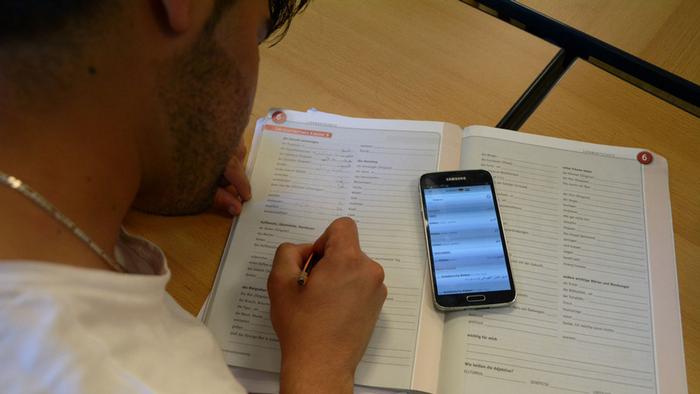Alemania/Noviembre de 2017/Fuente: Made for Minds
Resumen: Una escuela que no cuenta con Internet de alta velocidad y computadoras para cada estudiante se considera cada vez más como una escuela que se ha retrasado. Este problema se agudizó en Alemania, donde los esfuerzos de digitalización han sido lentos y la tecnología del aula varía ampliamente.
Según un informe publicado el viernes por la Fundación Bertelsmann, Alemania debe invertir cerca de 3.000 millones de euros (3.500 millones de dólares) al año en tecnología digital para las escuelas si quiere mantener su competitividad a nivel mundial. «La digitalización es la norma y una tarea a largo plazo», dijo Jörg Dräger, director de la Fundación Bertelsmann, tras la publicación del informe el viernes, en la que pedía que el gobierno federal diera más dinero a los sistemas escolares locales. Contabilizando computadoras, internet de alta velocidad, hardware, software, soporte técnico y herramientas de enseñanza digital, el precio para los 11 millones de estudiantes estimados en Alemania asciende a aproximadamente € 2,000 millones más que la estrategia digital propuesta por el Ministerio de Educación (pero aún en negociaciones) las escuelas piden.
A school without high-speed internet and computers for every student is increasingly considered a school that has fallen behind. This problem has become acute in Germany, where digitization efforts have been slow and classroom technology varies widely.
According to a report released on Friday by the Bertelsmann Foundation, Germany must invest nearly €3 billion ($3.5 billion) a year in digital technology for schools if it wants to stay competitive globally.
«Digitization is the norm and a long-term task,» Jörg Dräger, the director of the Bertelsmann Foundation, said upon the report’s publication on Friday, calling for the federal government to give more money to local school systems.
Accounting for computers, high-speed internet, hardware, software, technical support and digital teaching tools, the price tag for Germany’s estimated 11 million students amounts to about €2 billion more than the Education Ministry’s proposed (but still in negotiations) digital strategy for schools calls for.
Instead of teachers, ‘we get computers’
Dräger criticized officials for thinking in terms of giving schools a lump sum of money rather than making a sustainable long-term commitment.
The study’s proposal — in essence also a chunk of money, albeit allocated to high-speed internet, computers and other digital tools, but not training for teachers — evoked a similar reaction from some educators who say schools have more pressing problems. A huge investment sounds nice, they old DW, but it could easily turn into throwing money at a problem without arriving at a real solution.
«It’s a good idea,» the high school teacher Ingo Matthias said. «But we need at least as much money invested in training teachers how to use it.»
A lot of students already come to school knowing more about the latest technology than teachers do, the 49-year-old said. If they use technology in the classroom, it needs to have an educational purpose beyond merely replacing other media and a way to be implemented effectively.
«One of our programs was given €5,000 euros for books this year,» he said. «That’s more money that we can spend, so then it becomes surplus. That is to say: We now have a lot of books when in fact we desperately need more teachers. Instead of more employees we get books. Instead of teachers, we get computers.»
Germany is currently suffering a teacher shortage. According to figures released by the Süddeutsche Zeitung in September, more than 3,000 teaching positions still needed to be filled at the start of the 2017/2018 school year.
Matter of priorities
At schools where the latest gadgets are the norm — for example, at a vocational school where computer science is taught — teachers already know the advantages of high-tech classrooms.
But, even then, keeping up with the proper licenses, subscriptions and software updates has become a problem for teachers. The internet crashes often, too, Sarah, a vocational teacher who asked that her name not be used, told DW.
With so many problems plaguing Germany’s schools, the 33-year-old is more concerned about the number of students who can’t «write one single clear thought from beginning to end or properly formulate an argument.»
Should the quality of education continue to fall in Germany, Sarah said, no one will really need to worry about digitization.
Like Matthias, she fears that officials could «throw a half-baked educational concept into the room and hope that everything will be OK.»
Struggling to digitize
A weakened education system hit with fast-moving but ultimately half-baked efforts to bring computers into the classroom could spell long-term trouble for Germany.
The commitment to digitization — including educational opportunities for older Germans — was one of Chancellor Angela Merkel’s campaign pledges this year.
The government’s slow reaction to the world around it is symptomatic of a «culture that innovates in small steps, rather than through experimental leaps and bounds,» as a Handelsblatt report on Germany’s ailing tech sector put it in July.
Indeed, Germany was not one of the seven EU countries ranked among the top 10 global digital leaders by the World Economic Forum in 2016. The Networked Readiness Index measured the relation between a country’s use of technology to boost «competitiveness and well-being.»
Germany also failed to make the forum’s list of the seven «top movers» in global information technology or the top 10 tech-savviest governments.
Risk aversion and crippling bureaucracy are also cited as problems that contribute to Germany’s overall, as the Financial Times put it in January, «gnawing fear» that «the forces of digitization could sweep away the country’s economic and industrial preeminence.»
Fuente: http://www.dw.com/en/educators-germany-should-invest-in-teaching-before-tech/a-41230653












 Users Today : 29
Users Today : 29 Total Users : 35460412
Total Users : 35460412 Views Today : 54
Views Today : 54 Total views : 3419217
Total views : 3419217